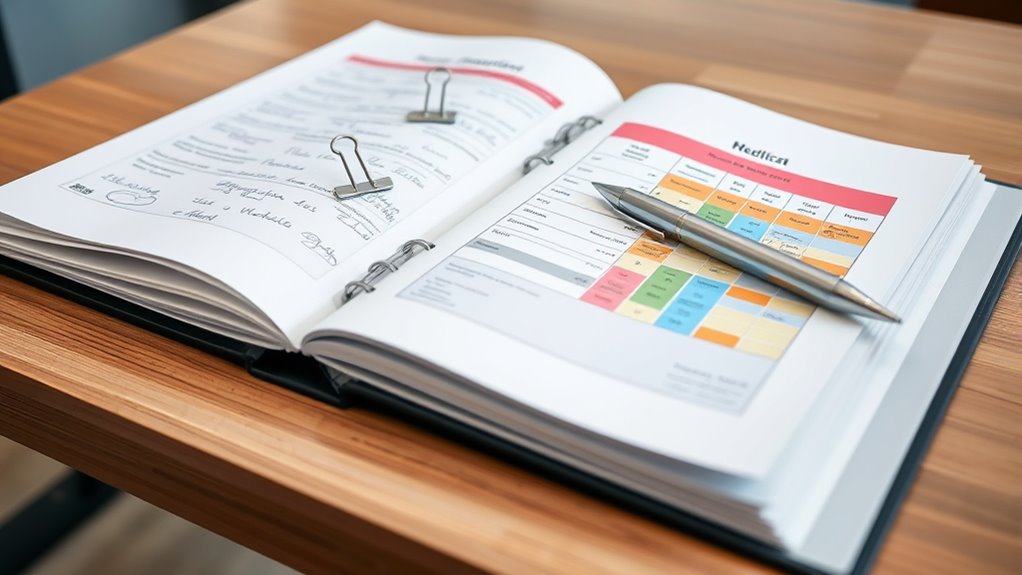To manage multiple doctors effectively, create a well-organized medical binder that consolidates your personal details, medical history, insurance info, and medication lists. Keep track of appointments, test results, and follow-ups, and update everything regularly. Include emergency contacts and important instructions for quick access during urgent moments. Maintaining this binder helps streamline communication and *guarantees* you stay on top of your health needs. Continued guidance will help you master the details of an efficient system.
Key Takeaways
- Organize personal, insurance, and medical information into clearly labeled sections for easy access.
- Keep detailed, chronological medical records, including test results, prescriptions, and specialist reports.
- Track appointments, test results, and follow-up actions with reminders and organized documentation.
- Maintain an up-to-date medication list, including dosages, refills, side effects, and prescribing doctors.
- Regularly review and update the binder, including emergency contacts and next steps, for comprehensive health management.
Gathering Essential Personal Information

Before scheduling appointments with multiple doctors, you need to gather essential personal information. This includes details that support emergency preparedness, such as your emergency contacts, allergies, and any existing health conditions. Make sure you have your current health insurance plans information ready, including policy numbers and provider contacts, to streamline billing and referrals. Collect your identification documents, like driver’s license or ID cards, and list any medications you’re taking. Having this information organized ensures quick access during emergencies or urgent visits. It also helps your healthcare providers deliver efficient care without delays. Keep these details in a dedicated folder or digital file, so you’re always prepared when scheduling new appointments or sharing your information with different doctors. Being aware of medical record management practices can further enhance the organization of your health information.
Organizing Medical History and Records
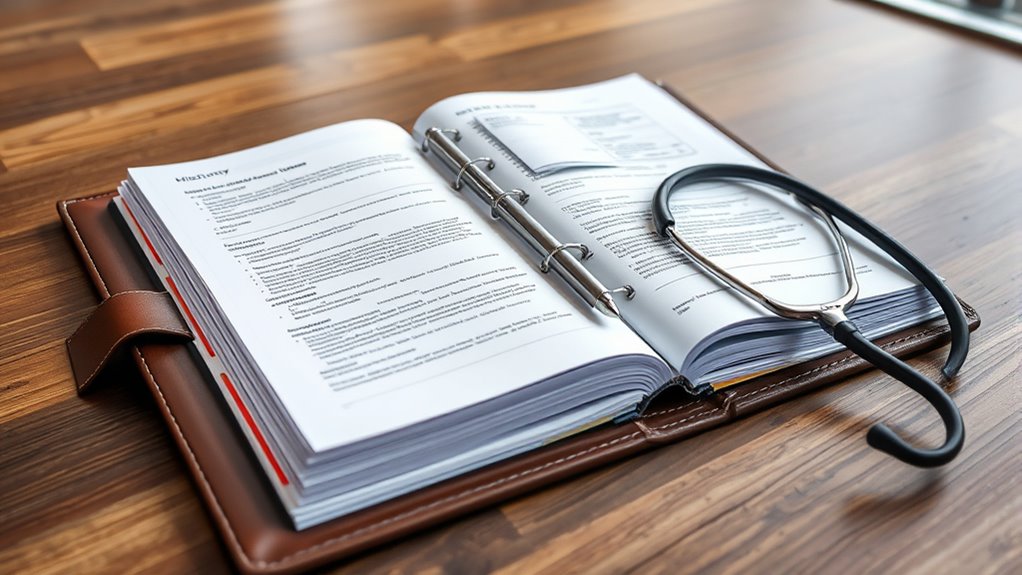
Organizing your medical history and records is essential for ensuring your healthcare providers have quick access to your complete health background. Include your dental history, noting any past treatments, procedures, or issues. Keep a record of immunization records, including dates and types of vaccines received. Use a clear, chronological order to make it easy to find specific information quickly. Store copies of your test results, prescriptions, and specialist reports alongside your dental and immunization records. Consider creating sections or tabs for different categories, such as dental, vaccinations, allergies, and medications. Regularly update your records to reflect new treatments or immunizations. Pay attention to medical record organization to streamline your health management process. Having organized, accessible records helps your doctors make informed decisions and provides a thorough view of your health history at a glance.
Keeping Track of Appointments and Test Results

How do you guarantee you don’t miss important health updates? The key is keeping detailed records of your appointments and test results. Use appointment reminders—set alarms or calendar alerts—to stay on top of upcoming visits. After each appointment, record test result summaries and notes about what your doctor discussed. Organize this information in your medical binder so you can quickly reference past results and track patterns over time. Regularly updating your records ensures you won’t forget critical details or miss follow-up tests. Having all this information in one place helps you communicate effectively with each doctor and stay proactive about your health. Consistency is essential—make it a habit to log appointments and test results as soon as they happen. Incorporating organized record-keeping techniques can further improve your ability to manage multiple healthcare providers efficiently.
Managing Medications and Prescriptions
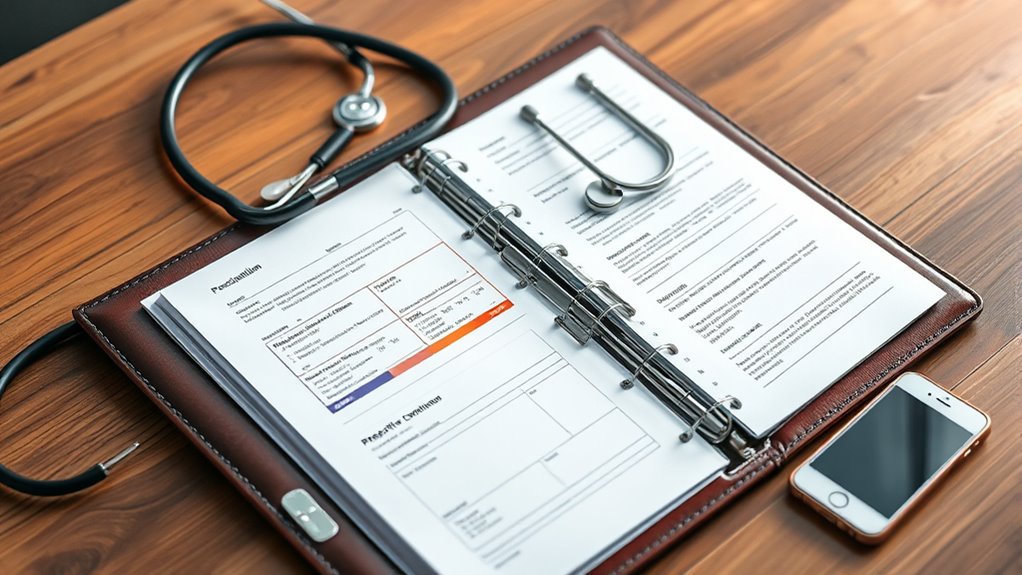
Keeping your medications organized helps prevent mistakes and guarantees you take the right doses. Tracking prescription refills keeps you from running out unexpectedly, while noting side effects helps your doctors adjust treatments if needed. Staying on top of these details makes managing multiple prescriptions much easier. Using a medication management system can further streamline your process and ensure accuracy.
Medication List Organization
Maintaining an accurate and up-to-date medication list is essential when managing multiple doctors, as it guarantees everyone has the correct information to provide safe and effective care. Organize your medications by listing drug names, dosages, and prescribing doctors. Use a pill organizer to assist with dosage tracking and ensure you take medications correctly. Regularly update your list whenever you start or stop a medication. Keep your list accessible in your medical binder so you can quickly share it during appointments. Here’s a simple way to organize your medication details:
| Medication Name | Dosage | Prescribing Doctor |
|---|---|---|
| Example: Metformin | 500 mg | Dr. Smith |
| Example: Lisinopril | 10 mg | Dr. Lee |
| Example: Aspirin | 81 mg | Dr. Patel |
This method helps keep your medication info clear and current, especially when coordinating care among multiple healthcare providers which is crucial for effective treatment.
Prescription Refill Tracking
Tracking your prescription refills guarantees you never run out of essential medications and helps prevent accidental missed doses. A reliable refill reminder system is key to staying on top of your medication schedule. To effectively manage this, consider these steps:
- Record refill dates in your medical binder for quick reference.
- Set alerts with your refill reminder system a few days before your medication runs out.
- Keep notes on the medication reorder process, including pharmacy contact info and prescription details.
- Regularly review your refill schedule with each doctor to avoid conflicts or duplicates.
- Utilize mental wellbeing index insights to recognize when medication adjustments might be necessary to support your overall mental health.
Medication Side Effects
Have you noticed any new or unusual symptoms since starting a medication? It’s important to pay attention to potential medication side effects, including adverse reactions. Some side effects may be mild, but others can be serious or indicate harmful drug interactions. Keep track of any changes in your body, such as rash, dizziness, or stomach issues. Always inform your doctor about these symptoms, especially if they worsen or don’t go away. Be aware that certain medications can interact with each other, increasing the risk of adverse reactions. By monitoring your symptoms and communicating with your healthcare providers, you can prevent complications and ensure your medications are safe and effective. Maintaining a detailed record in your medical binder helps you stay informed and prepared. Additionally, utilizing AI in Business tools like automation can streamline the process of tracking and analyzing your medication data for better health management.
Compiling Insurance and Billing Details

Keeping your insurance cards organized helps you find the right one quickly when needed. Tracking your billing statements guarantees you catch errors and understand your expenses. Make sure to update contact information regularly to avoid delays in billing and claim processing.
Insurance Card Organization
Ever wonder how to keep all your insurance information organized when managing multiple doctors? Start by creating a dedicated section in your medical binder for insurance cards. Use binder customization to set up clear categories, such as primary, secondary, and pharmacy insurance. For easy access, consider digital storage options like scanning cards and saving them in a secure folder on your device. To stay organized, remember to:
- Keep physical cards in clear, labeled sleeves in your binder
- Regularly update digital copies with current information
- Check expiration dates and replace cards as needed
- Store backup copies securely online or on your device
- Be aware that filtration systems, including HEPA filters, can help capture allergens and fine dust, improving indoor air quality.
This system ensures quick access and reduces the risk of losing important details, helping you manage multiple insurance providers effortlessly.
Billing Statements Tracking
Are you tracking your billing statements effectively when juggling multiple doctors and insurance plans? Staying organized helps prevent missed payments and unresolved billing disputes. Maintain a detailed log of each insurance claim, including the date, amount, and status. This way, you can quickly identify unpaid or denied claims. Use a table like this to keep everything clear:
| Date | Insurance Claim # | Status |
|---|---|---|
| 01/10/2024 | ABC12345 | Paid |
| 02/15/2024 | DEF67890 | Pending |
| 03/05/2024 | GHI23456 | Under review |
| 04/01/2024 | JKL78901 | Billing dispute |
| 05/10/2024 | MNO34567 | Paid |
This system helps you monitor insurance claims, catch billing disputes early, and stay on top of payments. Additionally, keeping copies of insurance documents organized can streamline the process when resolving issues.
Contact Information Updates
Accurate contact information is essential for managing billing and insurance communications effectively. Keeping details current ensures smooth claims processing and quick responses. When updating your info, consider these key points:
- Verify phone numbers regularly, practicing good phone etiquette when calling or updating providers.
- Decide whether to store digital or paper copies, based on your preference and accessibility.
- Update insurance and billing details promptly after any changes, avoiding delays.
- Keep both digital and paper records organized within your medical binder for easy reference.
- Regularly review contact details to ensure all information remains accurate and up-to-date.
Using digital records can streamline updates and reduce errors, but don’t neglect paper copies if you prefer tangible records. Regularly reviewing and updating contact info guarantees your billing process remains efficient and stress-free.
Including Emergency Contact and Important Contacts
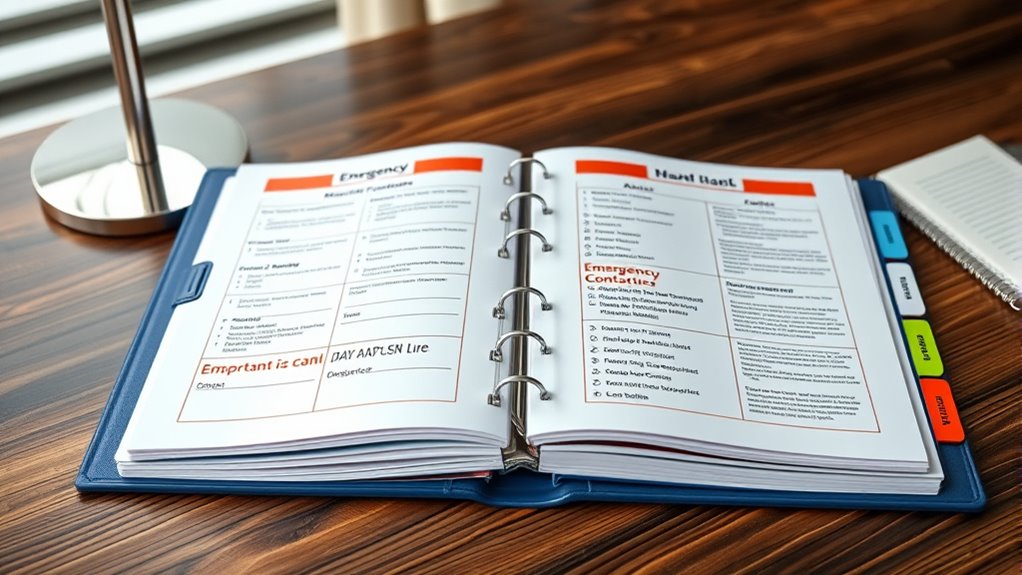
Have you organized a thorough list of emergency contacts and important phone numbers? Including these in your medical binder guarantees quick access when urgent situations arise. Your emergency contact should be someone who can make decisions or relay vital information if you’re unable to communicate. Important contacts include your primary care doctor, specialists, pharmacy, and nearby family or friends. Keep their names, phone numbers, and addresses up to date. Clearly label this section for easy reference. Consider adding any specific instructions, like allergies or medical conditions, that emergency responders might need. By compiling all these contacts in one place, you’ll reduce confusion and ensure help is just a quick glance away during emergencies.
Maintaining a System for Follow-ups and Next Steps

Keeping your emergency contacts organized helps you respond quickly in urgent situations, but it’s equally important to stay on top of follow-ups and next steps after medical appointments. To do this effectively, establish a system that includes:
- Setting appointment reminders in your calendar or phone.
- Recording follow-up protocols provided by each doctor.
- Tracking upcoming appointments and tests.
- Reviewing and updating your binder after each visit.
This keeps you proactive, ensuring no follow-up slips through the cracks. Use a dedicated section in your binder for follow-up schedules and instructions. Staying organized helps you manage multiple doctors efficiently, preventing missed appointments and ensuring your health stays on track.
Tips for Staying Up-to-Date and Maintaining Your Binder
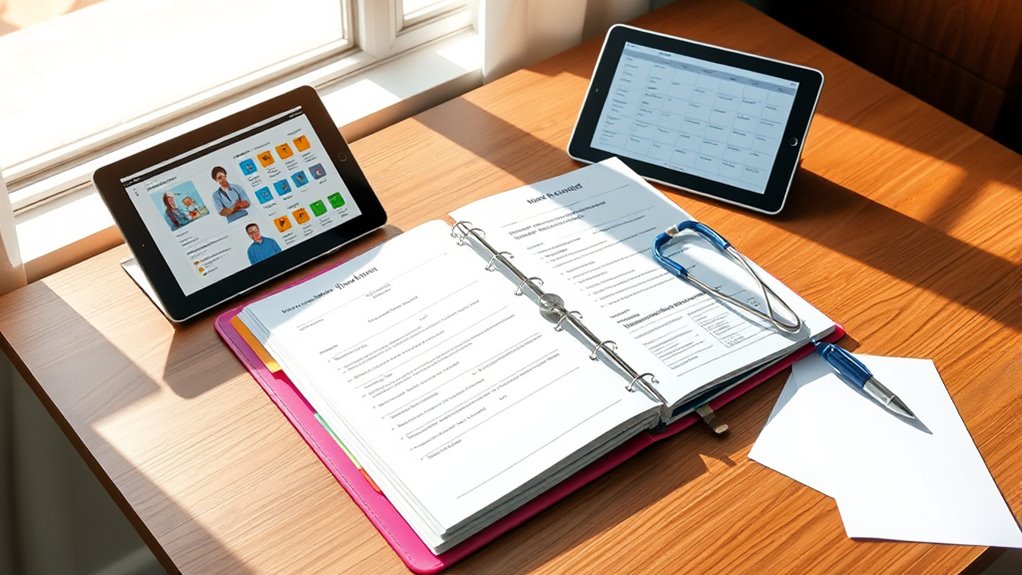
Staying up-to-date with your medical binder requires regular attention and consistent organization. Incorporate technology integration by setting reminders to review and update your binder weekly. Customize your binder to suit your needs, adding sections for new treatments or test results. Use labels and tabs for easy navigation. Stay disciplined about updating contact info and medication lists whenever changes occur. Consider digital backups to prevent data loss. Keep your binder in a consistent spot to avoid misplacement. Regularly review follow-up notes and upcoming appointments to stay informed. To help, here’s a quick guide:
| Task | Frequency | Tips |
|---|---|---|
| Update medication list | Weekly | Use binder customization |
| Review test results | After each appointment | Use technology integration |
| Check contact info | Monthly | Keep digital backup |
| Organize notes | Bi-weekly | Use clear tabs |
| Backup data | Quarterly | Use cloud storage |
Frequently Asked Questions
How Often Should I Update My Medical Binder?
You should update your medical binder at least every six months to guarantee all records are current. Set an updating schedule that aligns with your healthcare needs, such as after any doctor visits or new treatments. Regular record review helps catch any discrepancies or outdated information, making it easier to share accurate details with your doctors. Staying consistent with your updates keeps your binder an effective tool for managing your health.
How Can I Organize Records for Multiple Family Members?
You might worry about chaos when organizing records for multiple family members, but you can turn it into peace of mind. Start by creating separate sections for each person, including family history and medication lists. Use clear labels and digital backups. This way, you quickly access essential info during emergencies and stay on top of appointments, ensuring everyone’s health details are organized and ready when you need them most.
What Security Measures Protect My Sensitive Health Information?
You should prioritize security measures like encryption methods to safeguard your sensitive health information from unauthorized access. Implement access controls, such as passwords and user permissions, to restrict who can view or modify your records. Regularly update your security settings, use strong, unique passwords, and keep your devices secure. These steps ensure your health data stays private and safe from potential breaches.
How Do I Handle Medical Emergencies With My Binder?
In a medical emergency, your medical binder becomes a vital tool. Ensure it’s easily accessible and clearly labeled for quick reference. Include emergency preparedness details, like your allergies, medications, and medical conditions. Stay calm, and use the binder to communicate essential info to first responders or medical staff. Proper medication management in your binder helps prevent errors and speeds up treatment, making a crucial difference during urgent situations.
Can Digital Versions of the Binder Be More Effective?
Did you know that 85% of people find digital organization more efficient? Digital versions of your binder can be more effective because they allow easy access anytime and everywhere through cloud storage. You can quickly update information, share documents securely, and avoid losing physical papers. Using a digital binder streamlines managing appointments, medication lists, and emergency contacts, making your health information more accessible and organized, especially during urgent situations.
Conclusion
By keeping a well-organized medical binder, you’ll streamline your healthcare and stay on top of appointments, medications, and test results. Did you know that patients who maintain detailed records are 30% more likely to receive timely care? Staying proactive with your binder empowers you to manage multiple doctors effortlessly, ensuring nothing slips through the cracks. Make this small effort today, and you’ll gain peace of mind knowing your health information is always at your fingertips.
